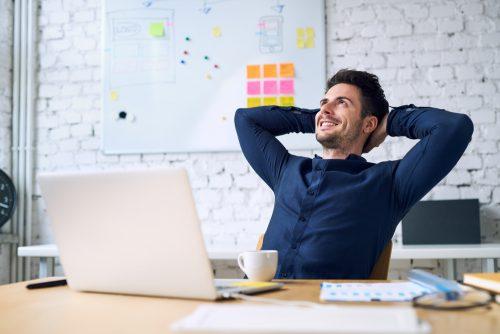
How to Relax at Work – Simple Techniques
While it may be well known that aspects of work can cause stress, less is known about ways to effectively relieve it. Whether it’s a new job, a promotion, tight deadlines, or uncooperative colleagues, everyone has aspects of their worklife that stress them out. In such times, it is important to manage thoughts and feelings in a way that helps rejuvenate, rather than compound what we are already experiencing. Some people may find that their work stressors not only affect their professional life, but aspects of their personal life as well, such as health, family, and relationships. Practicing techniques how to relax at work is one of the easiest ways to lower stress levels, manage symptoms of anxiety and depression, reduce absenteeism and increase productivity.
Although avoiding stressful situations altogether sounds like an appealing idea, this may not always be possible. Relaxation techniques involve refocusing attention towards something calming and increasing awareness of bodily sensations. Contrary to popular belief, relaxation is not only relevant to enjoying a hobby or achieving peace of mind. It is a process that decreases the effects of stress on the mind as well as the body.
Individuals who are more relaxed at work report being more motivated, take fewer sick leaves, and engage in less procrastination. Effectively organizing the physical workspace has also shown to declutter and calm the mind and boost productivity. Some relaxing elements of work environments include elements of nature such as plants and aquariums. While direct contact with nature has several health benefits, research shows that even glimpses of nature through a window or photographs can improve mental health and satisfaction and reduce stress levels.
Taking breaks from long periods of work is also an important part of maintaining health, efficiency, and productivity.
Some health benefits of relaxation include:
- Improved digestion
- Higher energy levels
- Increased confidence
- Lower blood pressure
- Improved concentration
- Improved quality of sleep
- Reduced activity of stress hormones
- Increased blood flow to major muscles
Some types of relaxation include:
Autogenic Relaxation
Autogenic relaxation is a technique that focuses on teaching the body to respond to verbal commands. This can include using visual imagery and bodily awareness to reduce stress. For some, it can look like repeating words and/or phrases either mentally or verbally, encouraging relaxation and reducing muscle tension. For example, individuals may imagine a peaceful environment, then focus on controlled and relaxed breathing which slows down their heart rate. Attention can then be diverted to feeling other physiological sensations such as relaxing each part of the body.
Progressive Muscle Relaxation
This technique focuses on slowly tensing and relaxing each muscle group, directing individuals’ focus to the difference between muscle tension and relaxation and simultaneously increasing awareness of physical sensations. One way of doing this is starting by tensing and relaxing the toe muscles, progressively working up to the muscles of the head and neck, and then back down to the toes. Some practice tensing for five seconds, relaxing for thirty seconds, and then repeating.
Visualization
This relaxation technique involves forming mental conceptions to take a visual journey to a peaceful and calming place or situation. Relaxing using this technique is most effective when the sensations associated with all the senses are incorporated into the visualized scenario. An example of visualizing relaxing on the beach may include thinking about the warmth of the sun on one’s body, the smell of saltwater, the sound of crashing waves, and the texture of sand. A quiet spot void of distractions where individuals can close their eyes, loosen any tight clothing and focus on their breathing helps to make the visualization more vivid.
It is important to remember that instinctually implementing these techniques is a skill that will improve gradually with time and practice. Different techniques may be more suited to different types of people. With this in mind, it may be beneficial to consider professional mental health services if feelings of stress and discomfort are persistent and seem overwhelming.
